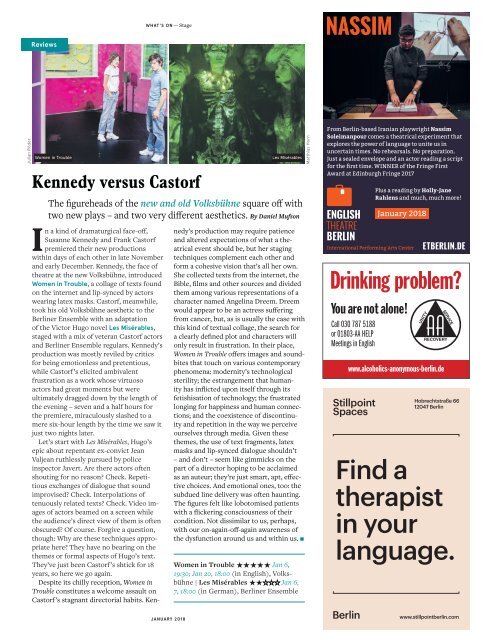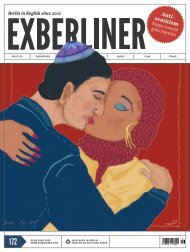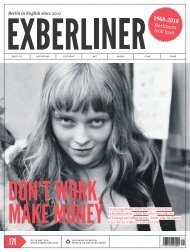Exberliner Issue 167, January 2018
You also want an ePaper? Increase the reach of your titles
YUMPU automatically turns print PDFs into web optimized ePapers that Google loves.
Reviews<br />
WHAT’S ON — Stage<br />
NASSIM<br />
Julian Röder<br />
Women in Trouble<br />
Kennedy versus Castorf<br />
The figureheads of the new and old Volksbühne square off with<br />
two new plays – and two very different aesthetics. By Daniel Mufson<br />
Les Misérables<br />
In a kind of dramaturgical face-off,<br />
Susanne Kennedy and Frank Castorf<br />
premiered their new productions<br />
within days of each other in late November<br />
and early December. Kennedy, the face of<br />
theatre at the new Volksbühne, introduced<br />
Women in Trouble, a collage of texts found<br />
on the internet and lip-synced by actors<br />
wearing latex masks. Castorf, meanwhile,<br />
took his old Volksbühne aesthetic to the<br />
Berliner Ensemble with an adaptation<br />
of the Victor Hugo novel Les Misérables,<br />
staged with a mix of veteran Castorf actors<br />
and Berliner Ensemble regulars. Kennedy’s<br />
production was mostly reviled by critics<br />
for being emotionless and pretentious,<br />
while Castorf’s elicited ambivalent<br />
frustration as a work whose virtuoso<br />
actors had great moments but were<br />
ultimately dragged down by the length of<br />
the evening – seven and a half hours for<br />
the premiere, miraculously slashed to a<br />
mere six-hour length by the time we saw it<br />
just two nights later.<br />
Let’s start with Les Misérables, Hugo’s<br />
epic about repentant ex-convict Jean<br />
Valjean ruthlessly pursued by police<br />
inspector Javert. Are there actors often<br />
shouting for no reason? Check. Repetitious<br />
exchanges of dialogue that sound<br />
improvised? Check. Interpolations of<br />
tenuously related texts? Check. Video images<br />
of actors beamed on a screen while<br />
the audience’s direct view of them is often<br />
obscured? Of course. Forgive a question,<br />
though: Why are these techniques appropriate<br />
here? They have no bearing on the<br />
themes or formal aspects of Hugo’s text.<br />
They’ve just been Castorf’s shtick for 18<br />
years, so here we go again.<br />
Despite its chilly reception, Women in<br />
Trouble constitutes a welcome assault on<br />
Castorf’s stagnant directorial habits. Kennedy’s<br />
production may require patience<br />
and altered expectations of what a theatrical<br />
event should be, but her staging<br />
techniques complement each other and<br />
form a cohesive vision that’s all her own.<br />
She collected texts from the internet, the<br />
Bible, films and other sources and divided<br />
them among various representations of a<br />
character named Angelina Dreem. Dreem<br />
would appear to be an actress suffering<br />
from cancer, but, as is usually the case with<br />
this kind of textual collage, the search for<br />
a clearly defined plot and characters will<br />
only result in frustration. In their place,<br />
Women in Trouble offers images and soundbites<br />
that touch on various contemporary<br />
phenomena: modernity’s technological<br />
sterility; the estrangement that humanity<br />
has inflicted upon itself through its<br />
fetishisation of technology; the frustrated<br />
longing for happiness and human connections;<br />
and the coexistence of discontinuity<br />
and repetition in the way we perceive<br />
ourselves through media. Given these<br />
themes, the use of text fragments, latex<br />
masks and lip-synced dialogue shouldn’t<br />
– and don’t – seem like gimmicks on the<br />
part of a director hoping to be acclaimed<br />
as an auteur; they’re just smart, apt, effective<br />
choices. And emotional ones, too: the<br />
subdued line delivery was often haunting.<br />
The figures felt like lobotomised patients<br />
with a flickering consciousness of their<br />
condition. Not dissimilar to us, perhaps,<br />
with our on-again-off-again awareness of<br />
the dysfunction around us and within us. n<br />
Women in Trouble HHHHH Jan 6,<br />
19:30; Jan 20, 18:00 (in English), Volksbühne<br />
| Les Misérables HH Jan 6,<br />
7, 18:00 (in German), Berliner Ensemble<br />
Matthias Horn<br />
From Berlin-based Iranian playwright Nassim<br />
Soleimanpour comes a theatrical experiment that<br />
explores the power of language to unite us in<br />
uncertain times. No rehearsals. No preparation.<br />
Just a sealed envelope and an actor reading a script<br />
for the first time. WINNER of the Fringe First<br />
Award at Edinburgh Fringe 2017<br />
etb<br />
<strong>January</strong> <strong>2018</strong><br />
International Performing Arts Center<br />
You are not alone!<br />
Call 030 787 5188<br />
or 01803-AA HELP<br />
Meetings in English<br />
Plus a reading by Holly-Jane<br />
Rahlens and much, much more!<br />
ETBERLIN.DE<br />
www.alcoholics-anonymous-berlin.de<br />
FBW Update.indd 1 06/10/16 13:<br />
JANUARY <strong>2018</strong>


















